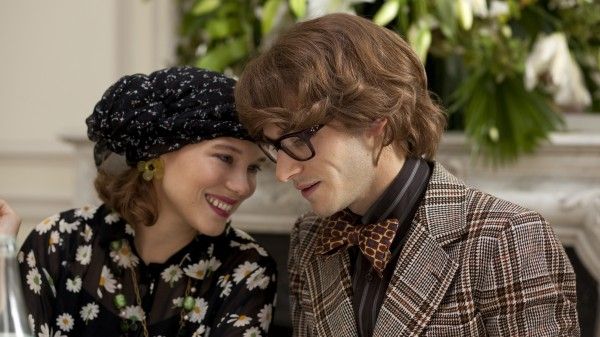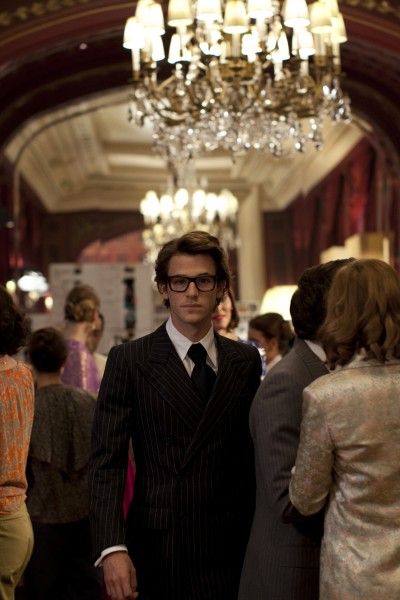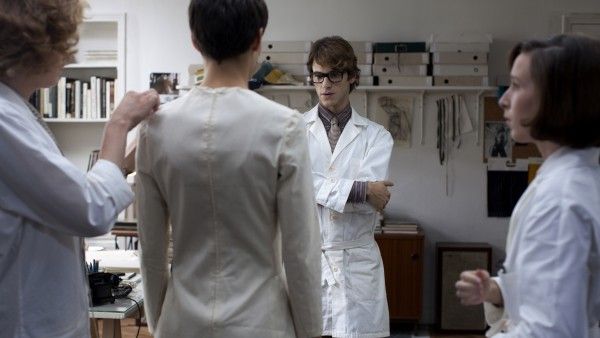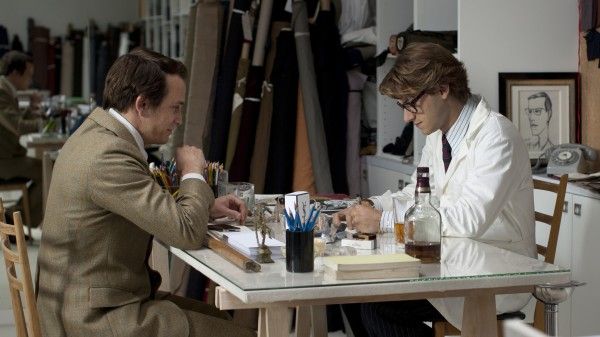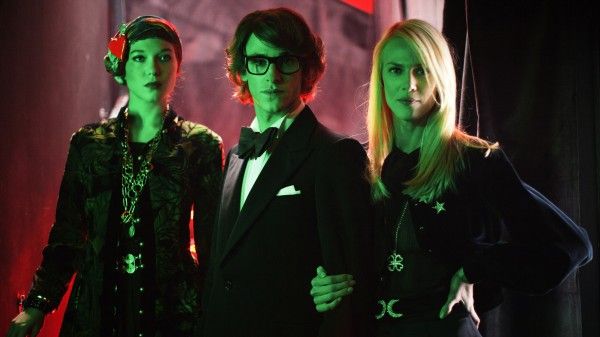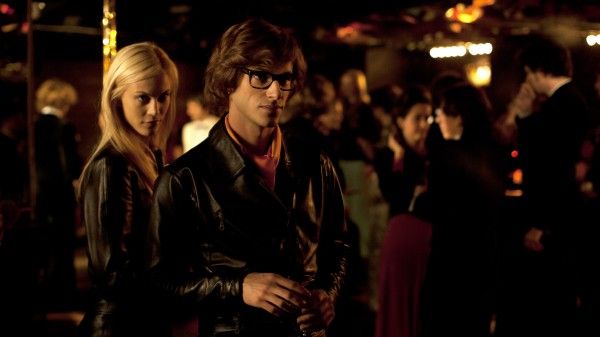Gaspard Ulliel turns in a mesmerizing performance in Saint Laurent, Bertrand Bonello’s unconventional biopic about legendary French fashion designer Yves Saint Laurent who died in 2008. The haute-couture story unfolds in non-linear fashion shifting back and forth in time to reveal a series of pivotal moments in Saint Laurent’s life and career. Ulliel makes the intimidating role his own in this riveting portrait of a highly creative and complicated artist whose behavior ran the gamut from charming to aloof, neurotic, vulnerable and delusional. The drama also stars Jérémie Renier, Louis Garrel, Lea Seydoux and Helmut Berger.
In an exclusive interview, Ulliel discussed how the project first emerged, his research and preparation for the part, why a non-traditional biopic that felt like a journey into the mind of a tortured artist appealed to him, his collaboration with Bonello who gave him the freedom to reinvent his character in his own personal way, how he captured Saint Laurent’s unique voice, why it was important to show how the dark aspects of Saint Laurent’s personality fueled his creative drive, the kiss he shared with Garrel, how Saint Laurent seized the essence of an era and used it in his fashion, and what Ulliel is working on next. Check it all out in the interview below:
Can you talk a little about how this project first emerged?
GASPARD ULLIEL: It’s kind of a long story. It’s fun when I think about it because it all started, even if there’s no link with this specific project, ten years ago, I would say. I worked with Gus Van Sant on a short film, a project called Paris, je t’aime. There was a succession of short films for each district in Paris. We worked on this project, and a few months later, he called me because he had this idea of adapting a book that was written in that time of Yves Saint Laurent. It was a very interesting book by the way called The Beautiful Fall written by Alicia Drake about Saint Laurent and Karl Lagerfeld’s rivalry. He wanted to cast me as a young Saint Laurent. The film was never made, and I kept thinking back about this saying, “It’s such a shame because it would have been such an amazing character to work on.”
Years later, I heard about this project being made about Yves Saint Laurent, but it was the other one, the Jalil Lespert film. So I phoned my agent saying, “You know what, there’s a film that’s going to be made and I would be a perfect Saint Laurent.” He said, “Okay, let me see what’s going on.” It was just when Jalil was starting to write the script, so he said, “I’ll see Gaspard when I’m ready because obviously he could be a good Saint Laurent.” A few weeks later, my agent called me back saying, “How odd is this? You have a meeting next week with Bertrand Bonello for another project on Saint Laurent.”
That’s when I met Bertrand for the first time. He still wanted me to go through a screen test because I think he saw a bunch of other French actors for this part. We met three or four times for different working sessions on different scenes of the film. Then one morning he phoned me saying that he wanted to do the film with me. I was thrilled obviously because it’s just a great character to work on. I was so happy to be working with Bertrand because I’m a big fan of his films. One thing that is very appreciable is that I had a lot of time to prepare because he actually cast me a long time ahead of the shooting. I had nearly a year to prepare myself. This was a very long process.
What was your reaction when you first read the script?
ULLIEL: I remember that I phoned Bertrand just after reading the script the first time saying, “You know what I love about this film? It’s that it’s not just about Saint Laurent. For me, it’s a film about creation of artistic life, and it’s more like a journey into the mind of a tortured, creative artist. It’s way more open than just a simple biopic.” Also, as an actor, when you open a script and you read for a specific part, in some cases you don’t find any immediate inspiration or connection with the part. In this particular case, I remembered that instantly I could feel a lot of things echoing into my own personality, my own life, my own memories. So I had a lot of things I could identify with.
How did you prepare for the role?
ULLIEL: Well, the first reflex was just basic research, just gathering as much information as I could. There was a lot of reading, a lot of books, and only a few visual documents. On the specific decade we’re talking about in the film, there’s not a lot. But there’s enough, for example, to be working on the voice. This was a very important question that kept pending for quite a long time because we didn’t have any clear idea of how far I should go in the transformation of my own voice. From the very beginning, I knew there was something to be done voice-wise because he had such a peculiar voice and way of speaking. For many people, in the memories they have of this man, there’s this special voice. And so, what I did was I just listened to all the recordings I could find and let my ear absorb the sounds. I never tried to work in a very precise, analytic way or analyze the sound or anything like that. It was more about letting my ear absorb the sound so that on day one it would just come out in the most natural, spontaneous, and organic way.
What was the directing process like? Did Bertrand give you a lot of latitude to explore your character and the material?
ULLIEL: Yes. We worked a lot in advance. Then, on the set during the shoot, it was like everything had already been discussed about it and prepared, so it was smooth. We didn’t really need to talk on the set. Even just the look a director gives you says so many things. It’s all about eye contact and organic communication. I think Bertrand also wanted me to feel a lot of freedom. One of the first things he said when we started preparing for the role was that if he was casting me, it was also because he wanted to film me. In the end, the idea was maybe for me to be fifty percent of Yves and fifty percent of myself. That was a very important way to put it for me. The day when I understood that it was more about inspiration and appropriation rather than pure imitation was a very important milestone in my whole process of preparation for this part. That’s when I started to step back from all those documents, readings and information to clear some space within which I could fantasize about this character and reinvent this character in my own personal way.
What were some of the challenges of capturing the era and the universe that this complicated man existed in? How hard was it to embrace all those elements?
ULLIEL: I think that is what is his real richness. The complexity of it is what made it so great. It’s like this man is in constant limbo, in a liminal state. He’s in between two men, in between two collections, in between two eras, and in between candeur (ingenuousness) and decadence, and light and darkness. It’s all about that and how you go from one to another. His psychiatrist would call him “Le Liftier,” the Elevator Man, because he was going up and down all the time. I think what is really shown in this film about Yves Saint Laurent as a fashion designer and as an artist is how well he could seize the essence of an era and respond to it in his fashion and use it in his creations.
What was it like working with Jérémie Renier and Louis Garrel who played Saint Laurent’s lovers at different stages of his life and creating that chemistry and sexual tension on screen?
ULLIEL: With Jérémie, the one who plays Pierre Bergé, it was not that hard, and I think that’s also one of the reasons why Bertrand cast Jérémie. We’ve been very close friends for more than ten years so it helped a lot, because the film starts at a point in Yves’ life where he’s been a couple with Pierre Bergé for many years. We had this immediate intimacy from our private friendship. With Louis, it was totally different because we barely knew each other before the shooting. He actually arrived right in the middle of the shooting. He started much later than I did.
I was a bit anxious about how it would work, and in the end, it just worked very smoothly. I don’t have any explanation for this. It’s more about something unconscious and organic. Bertrand could see that it was going on really well between us. I think it was on the second day of shooting between Louis and I that he came to us with this idea of a kiss which gave this amazing moment in the film. This was not scripted. He saw that it would work, that we would be okay for this kiss. We agreed straightaway. We actually said to him, “Okay, we will give you one take.” He was so smart that he just kept the camera rolling and it gave the film a great moment.
You’re portraying a character who often used his darkest moments to fuel his creativity. Obviously, it’s in the script but, as an actor, how did you capture the nuances of that creative process?
ULLIEL: We couldn’t portray this man without exploring also the dark side because it’s part of his life. It’s part of his creative process, I think. And it shows how emotions in art are inextricably linked. For me, that was an interesting point. From the very beginning, I thought that all those seemingly dark and dangerous night scenes full of reckless abandon and ecstasy were actually the place where Yves was living again and reaching for light and lightness in himself as opposed to all those studio scenes that are way more structured and serious. In my own personal dialectic, [the studio scenes] were becoming more like imprisonment scenes or incarcerations compared to those night scenes where he was actually finding all his inspiration.
What do you think Yves Saint Laurent’s legacy is today?
ULLIEL: For me, I think he’s one of the last great fashion designers and couturiers. The film is also about this. It’s about a world that is changing, an industry that is evolving a lot. It’s the beginning of branding and the economic pressure that is changing, too. Today’s fashion industry is way different from what it was at that time and maybe the film is also about this last decade in a very different fashion industry. I don’t think today there is the same space for fashion designers to create like Yves was doing it at that time. So, it’s that he’s one of the last, great geniuses in fashion.
What did you learn about yourself as an artist in the process of bringing this character to life?
ULLIEL: You have to embrace fully your entire life, your entire memories, and emotions to actually nourish, well for me, my parts and my future projects. I think an actor can actually gather moments, memories and emotions for his next character. So, it’s a constant work. Also, one interesting thing is, when you think about this specific job, we can talk about an artist even if it’s just a fashion designer, but compared to other forms of art, like for example a director or a novelist or a painter, they can take the amount of time they need to create. As for a fashion designer, you have those very precise deadlines to keep so you have to renew yourself constantly every three or six months. When you think about it, it’s so intense. An actor after a film can decide to just take a break until his next role. As a fashion designer at such a big fashion house as YSL, there is so much pressure the entire time. Either you quit or you just keep going, and then you have to respect those specific deadlines.
What was the most challenging aspect of making this film?
ULLIEL: Obviously, the most challenging thing is how to portray someone that is so well known that people still recall him in a very precise way. I knew there would be a lot of expectations. It took me some time to actually free myself from this weight and to feel free to step back from reality and create my own version of this man, because after all, when you think about it, that’s what cinema is about. It’s seeking truth and reality through artifice and lies. For me, cinema becomes grandiose when it imposes its own mythology and its own reality. In the end, when I thought about it, I was still portraying Yves Saint Laurent, but within a fictional work, a fictional character in a way.
What gave you the greatest satisfaction?
ULLIEL: It’s when you finally see that it works because I think for every artist it’s important to always keep this amount of doubt until the very last day of shooting. Some people have asked me, when was the day you realized you had actually found the character and that you had it. I would just say I never felt like this. Until the very end, I was still asking myself if it was working or not. I think it’s the same for the director. And then, when you discover the film, you finally realize that it all worked.
Did you have a friends & family screening and what was their reaction when they saw the film?
ULLIEL: Oh yes, a bunch of my friends saw it and my parents saw it quite early. I was kind of curious about how they would respond to it because it talks about this specific era that means a lot to my parents who experienced it. They were in Paris at that time already working in fashion because both of my parents are in fashion industries. They had interesting point of views on the clothes and the sets. For example, for the club scenes, we actually rebuilt the interior of some very famous clubs that were in Paris at that time. My parents knew those places so it was kind of moving to see that. My mother came one day to visit me on set, in this nightclub set, and it was actually exactly how she remembered this place from her early life.
What are you working on next that you’re excited about?
ULLIEL: I’m going to start a new film at the end of May, but unfortunately I’m not allowed to say anything about it. The only thing I can tell you is that it’s going to be in French, but it’s not a French director. It’s half-French, half-American. It’s a drama.
Earlier in your career, you expressed an interest in directing. Do you still aspire to direct at some point?
ULLIEL: I do, but somehow today it feels even less accessible. There is added pressure, I think. I understand how important it is to be in this position and what it really means. I think it’s a very high responsibility and you don’t just make a film to make a film. If you decide to direct a film, it’s because you have something to say, something to show to the audience. And so, I still have this very strong desire, but at the same time, I don’t know if I’m really ready yet.
Who are the filmmakers that inspire you?
ULLIEL: There are a lot. But I would say something changed recently. I studied cinema at the university so I had a very classical approach to it. I studied all those silent films, and then the films from the 1940’s, the Nouvelle Vague, the late Hollywood films. Now I realize, as a young actor, that it’s one of my duties to actually be aware of what is today’s industry and today’s next big directors. So, I’ve been trying for the past few years to be very open to all those first features and see how the world cinema is actually evolving. I’m always very interested in going and discovering a young director’s films. For example, in the U.S., there’s this film that came out last year called Blue Ruin. It’s directed by Jeremy Saulnier. It was just an incredible piece and I’m very eager to see what his next film is going to be. Also, there’s another film called It Follows by David Robert Mitchell that I think was just released here. This one is pretty amazing, too.
Saint Laurent opens in LA & NY on May 8th.


